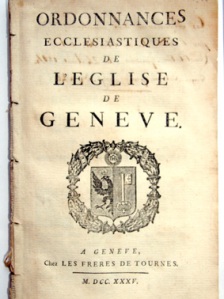The following is part 4 of an excerpt from Presbyterians: Their History and Beliefs by Walter Lingle (John Knox Press, 1950). Click here to read part 1, part 2 and part 3. Today marks John Calvin’s 500th birthday. May Calvin’s life, piety and ministry serve to reform yours by God’s glorious grace according to the Word of God.
Return to Geneva. After Calvin and Farel were banished, things went badly at Geneva. The immoral element got control, and the moral life of the city became unspeakable. The Roman Catholic Church made a determined effort to overthrow Protestantism. Visitors, strangers, and refugees who had come to Geneva because John Calvin was there ceased to come. The people of Geneva began to realize that John Calvin was a great spiritual, moral, and financial asset. There was a growing sentiment for his return.
In the autumn of 1540 the City Council sent an invitation to Calvin by a special messenger, urging him to return to Geneva. He made a cordial response but declined. They sent him one invitation after another, and brought great pressure to bear upon him. They even had William Farel write one of his characteristic letters pronouncing a curse upon him if he did not return. Feeling that the call must be from God, Calvin yielded and returned to Geneva, arriving September 13, 1541. There was great rejoicing and his friends gave hi a triumphal entrance into the city. But there were still bitter enemies who gave him no end of trouble in the years that followed.
Beginning Anew. John Calvin took up his work in Geneva where he had left off at the time of his banishment, and he did it without apology. Going before the City Council he urged the importance of having a thoroughgoing Form of Government and Discipline for the church and the city. The doctrine of complete separation of the church and the civil government, as held by Presbyterians today, was not held in Geneva, nor anywhere else in those days.
The City Council approved of Calvin’s request and appointed a committee, with Calvin as chairman, to prepare the necessary documents. In due time he presented the City Council with a very complete Form of Government and Discipline for their approval. In this notable document we have what Calvin believed to be the Scriptural principles of church government and discipline.
As stated above, Calvin went back to the bible for everything pertaining to the church–for government, doctrine, worship, discipline, and life. When he studied church government in the Bible he did not find any popes, cardinals, archbishops, and bishops, such as he had known in the Roman Catholic Church from his youth up. Instead he found a church with a very simple form of representative government by elders. He also found in the Bible other church officials called pastors, teachers and deacons. So in the Form of Government drawn up by Calvin there were pastors, elders, deacons, and teachers. When the City Council approved of this Form of Government, the church in Geneva became a Presbyterian church in fact, if not in name. It was called the Reformed Church.


[…] My friend John Chitty at Captain Headknowledge is providing excerpts on an overview of Calvin’s life: part one, part two, part three & part four. […]
[…] Beliefs by Walter Lingle (John Knox Press, 1950). Click here to read part 1, part 2, part 3 and part 4. courtesy of […]
[…] and Beliefs by Walter Lingle (John Knox Press, 1950). Click here to read part 1, part 2, part 3, part 4 and part […]
[…] and Beliefs by Walter Lingle (John Knox Press, 1950). Click here to read part 1, part 2, part 3, part 4 ,part 5 and part […]